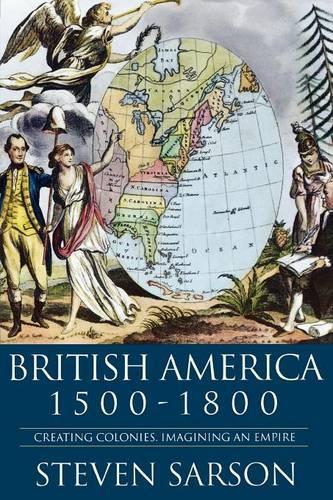
British America 1500-1800: Creating Colonies, Imagining an Empire
(Paperback)
Publishing Details
British America 1500-1800: Creating Colonies, Imagining an Empire
By (Author) Professor Steven Sarson
Bloomsbury Publishing PLC
Hodder Arnold
9th June 2005
United Kingdom
Classifications
General
Non Fiction
970
Physical Properties
Paperback
352
Width 156mm, Height 234mm, Spine 23mm
606g
Description
British America combines the histories of colonies and empire - usually distinct fields of enquiry - in a sweeping introduction to and interpretation of the British-American New World. This book argues that while settlers created colonies, the early empire remained a largely imaginary construct. Writers, explorers, and colonial proprietors imagined colonies and empire as corporate entities serving various political, religious, and social purposes. Yet, these visions were invariably usurped by settlers who created colonies according to principles of political autonomy and individual independence based on private property, even if the liberties their ideals engendered entailed the extermination and expulsion of Native Americans and the enslavement of Africans. English and then British governments encouraged autonomy by granting colonies as private proprietorships, and then accommodating the settler-led polities that subsequently emerged. When Britain finally imposed a vision of empire from the 1760s, the settlers declared their independence, forcing Britain to consider imperialism as something much more than imaginary. This account examines the way in which the New World was invented and offers a convincing analysis of the loss of the First British Empire.
Reviews
Sarson's volume is essentially a textbook on early American history, covering the whole of settlement from the Maritime Provinces to the Caribbean and beyond. As such it is a good one. Sarson has compiled detailed narratives of the social and political development of every colony from the well-known stories of Virginians and New Englanders to far less familiar West Indian islands Especially intriguing is that Sarson extends not only the geographic but also the chronological boundaries of the field, managing most unusually to extend the story beyond 1776 even to the formation of a new government of the United States without losing sight of the larger context of British settlement and empire as imperial development extended into the northern reaches of North America and beyond. Ned C. Landsman, William & Mary Quarterly
Author Bio
Steven Sarson is Lecturer in History at University of Wales, Swansea
